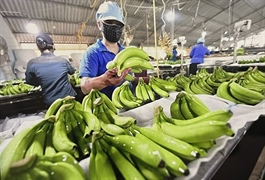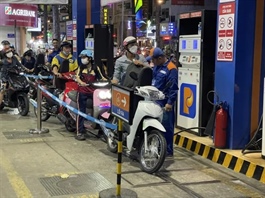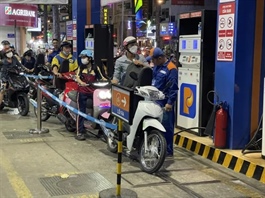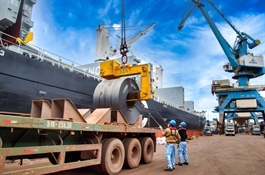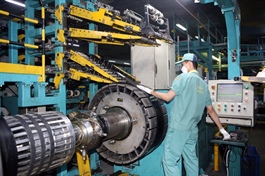Capital’s e-motorbike market to surge amid looming ban
Capital’s e-motorbike market to surge amid looming ban
A proposal to ban petrol-powered motorbikes in inner Hanoi is expected to boost demand for electric motorbikes, but concerns remain around charging infrastructure and the need for a broader product range.
Vietnam’s two-wheeled vehicle market has never faced greater pressure to electrify. On July 12, Prime Minister Pham Minh Chinh signed a directive outlining urgent tasks to drastically prevent and resolve environmental pollution, including a ban on fossil-fuel-powered motorbikes within Hanoi’s Ring Road 1 from July 2026.
To comply with the upcoming regulation, motorbike manufacturers will need to offer affordable electric models or risk being excluded from the all-electric two-wheeler market.
Experts noted that while electric bike sales are rising in Vietnam, they still account for a small share compared to petrol-powered motorbikes. The proposed ban in Hanoi’s central districts is reshaping the market and is expected to intensify competition among e-bike producers.
Nguyen Duc Hung, owner of an e-bike shop in Cau Giay ward, said, “If Hanoi bans petrol motorbikes in the inner city, demand for e-bikes will surge. However, there are not many well-known brands offering diverse models across different price points.”
According to Kirin Capital, which is a financial services firm specialising in equity investment management, VinFast leads the market with a 32 per cent share, followed by Pega (15–16 per cent), and Yadea (12–13 per cent). Startup Dat Bike holds around 2–3 per cent and plans to expand rapidly. Traditional fuel-powered motorbike manufacturers have begun entering the segment, though only on a trial basis.
VinFast recorded e-bike sales of over 70,000 units in both 2023 and 2024, offering a range of products from budget models under $1,000 to higher-end options priced at up to $2,200.
In 2024, Yadea significantly increased its investment and commercial operations. Following its first factory in the Quang Chau Industrial Zone in the northern province of Bac Ninh, it began construction of a second facility in the Tan Hung Industrial Zone, also in Bac Ninh, with a total investment of $100 million.
The new factory is expected to be operational this year, bringing the combined annual production capacity to 2.5 million bikes. Yadea currently offers 15 e-bike models priced between $480–1,000, distributed through 700 outlets nationwide.
Startups have also emerged in this segment. Selex Motors, established in 2018, has created an open logistics ecosystem by partnering with Ahamove and Be Group to deploy thousands of e-bikes. Its battery-swapping stations allow riders to replace depleted batteries with fully charged ones in under two minutes.
Dat Bike, another startup, targets long-range and high-speed performance. In 2022, it raised $25 million and converted into a wholly foreign-owned enterprise, establishing a legal entity in Singapore.
Despite holding more than 80 per cent of Vietnam’s fuel-powered motorbike market, Honda entered the e-bike space cautiously, launching the ICON e: model only recently. Fellow Japanese manufacturer Yamaha has only one electric product, launched in 2022 and which has yet to gain traction with Vietnamese consumers.
To support the petrol motorbike ban, Nguyen Van Thanh, former deputy director general of the Department for Roads of Vietnam under the Ministry of Construction, said, “It is necessary to encourage manufacturers to offer trade-in schemes for old petrol motorbikes and to reduce e-bike prices. Additional measures such as exempting registration fees, lowering special consumption tax, or offering subsidised instalment plans should also be considered.”
Khuong Kim Tao, former deputy chief of the Office of the National Traffic Safety Committee, supported the e-bike shift but raised concerns about charging facilities and electricity supply once millions in the capital transition to electric vehicles (EVs).
“Most bikes are charged at home, so we need safety measures to prevent fire and electrical hazards, especially in apartment blocks,” Tao said. “The electricity sector must urgently assess how to mobilise supply if all petrol motorbikes are converted to e-bikes. Will there be enough power? How fast can we deliver it to consumers? How can we develop a charging network capable of serving a surge in demand next year?”
A World Bank report from last November stated that to meet EV targets in the coming years, Vietnam would need to increase grid capacity by 12–20 per cent between 2045 and 2050, placing significant pressure on power generation.
“To reduce the impact of EV adoption on the electricity system, Vietnam must improve grid efficiency and battery technology,” the report noted. “The government should also promote a shift from private vehicles to electric public transport, and from electric trucks to rail or waterways.”
According to the World Bank, Vietnam will need 800,000 chargers and two million batteries by 2030. By 2050, this will rise to six million chargers and 10 million batteries. The country’s battery demand is projected to reach 4.8 million units by 2040 and 10.7 million by 2050.
To develop its charging station network, the World Bank recommended using public-private partnerships and creating a policy environment that incentivises private investment. It suggested that public subsidies for charging infrastructure could be five to six times more effective than subsidies for vehicle purchases.
Nguyen Duc Hung of Cau Giay ward in the capital said consumers remain concerned about the short lifespan and high cost of EV batteries. “If there’s support for battery replacement and charging stations become widespread, people will switch to e-bikes,” he said. “But manufacturers must improve battery technology, offer a wider range of products, and guarantee transparent, reliable after-sales service.”
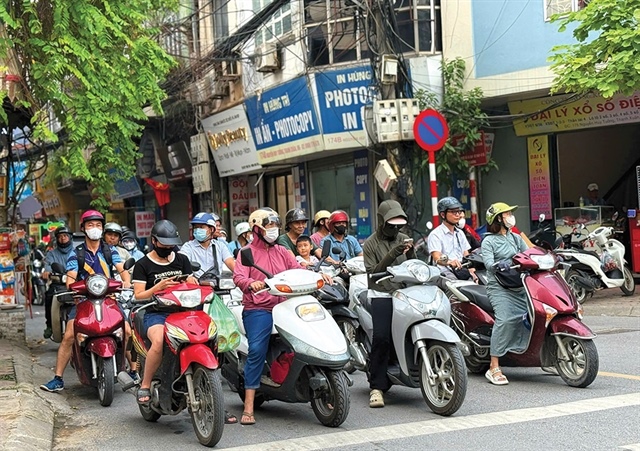
Capital’s e-motorbike market to surge amid looming ban |
Duong Duc Tuan, vice Chairman Hanoi People’s Committee
Hanoi People’s Committee will study to establish a mechanism and policy to support people converting petrol-powered vehicles to EVs. About 450,000 motorbikes are operating within Ring Road 1. Some fees for new EVs like registration, registration fees, and related issues will be supported by the city. The support policy will be very specific targets for each subject and type of vehicle.
Public transport will develop strongly by adding numerous small e-buses with 8-12 seats. Hanoi will even consider four-seat EVs for transit inside the Ring Road 1. The city will also accelerate building of metro lines – a modern, clean, green means of transport – because other vehicles entering the area will also have to use EVs. Moreover, Hanoi will also supplement the planning of charging areas for all types of EVs and other clean energy vehicles. At first, charging stations at static traffic points, parking lots, and in residential buildings will be prioritised.
Bui Thi An, president, Institute of Resource Environment and Community
The prime minister’s directive has clear goals, in line with the sustainable development of the country in general and the capital in particular. This will be feasible if Hanoi prepares many systematic, synchronous, and practical solutions. One of the key preparation issues for this policy to be effective is to assess the impact on the livelihoods of people, especially those who use motorbikes to earn money.
There are nearly seven million motorbikes and 1.2 million cars now, excluding the vehicles of people from neighbouring areas who come to Hanoi to do business every day. For many people, motorbikes are not only a means of transportation but also a means of earning. If they are asked to switch to e-bikes or buses in a short time without any reasonable support, it will be a shock for them.
The authorities of Hanoi’s communes and wards should undertake the task of surveying each household to assess how this policy will impact their lives, and report to the city authorities for support solutions. It is quite difficult and costly to support the conversion of all seven million petrol-powered motorbikes to e-bikes, so it is necessary to classify and support in some stages, that may prioritise those living and working within Ring Road 1.
The development of green public transport should be accelerated to ensure people’s daily lives, especially at transit points such as bus stations, metro stations, schools, and markets. For example, people outside Ring Road 1 can ride motorbikes and park in areas where petrol-powered motorbikes are banned, so they will need somewhere for parking.
Additionally, green public transport such as e-buses and metro should be expanded quickly for people to travel around the city easily. Hanoi needs to redraw the travel map and re-plan public transport routes in the urban core.
Despite numerous challenges, I believe in Hanoi’s ability to succeed if the necessary conditions are ensured such as serious investment in technical infrastructure and services; a fair and transparent policy to support the exchange of vehicles; drastic implementation in all communes and wards; and ensuring that people’s access to public transport is not affected.
- 11:04 25/07/2025








